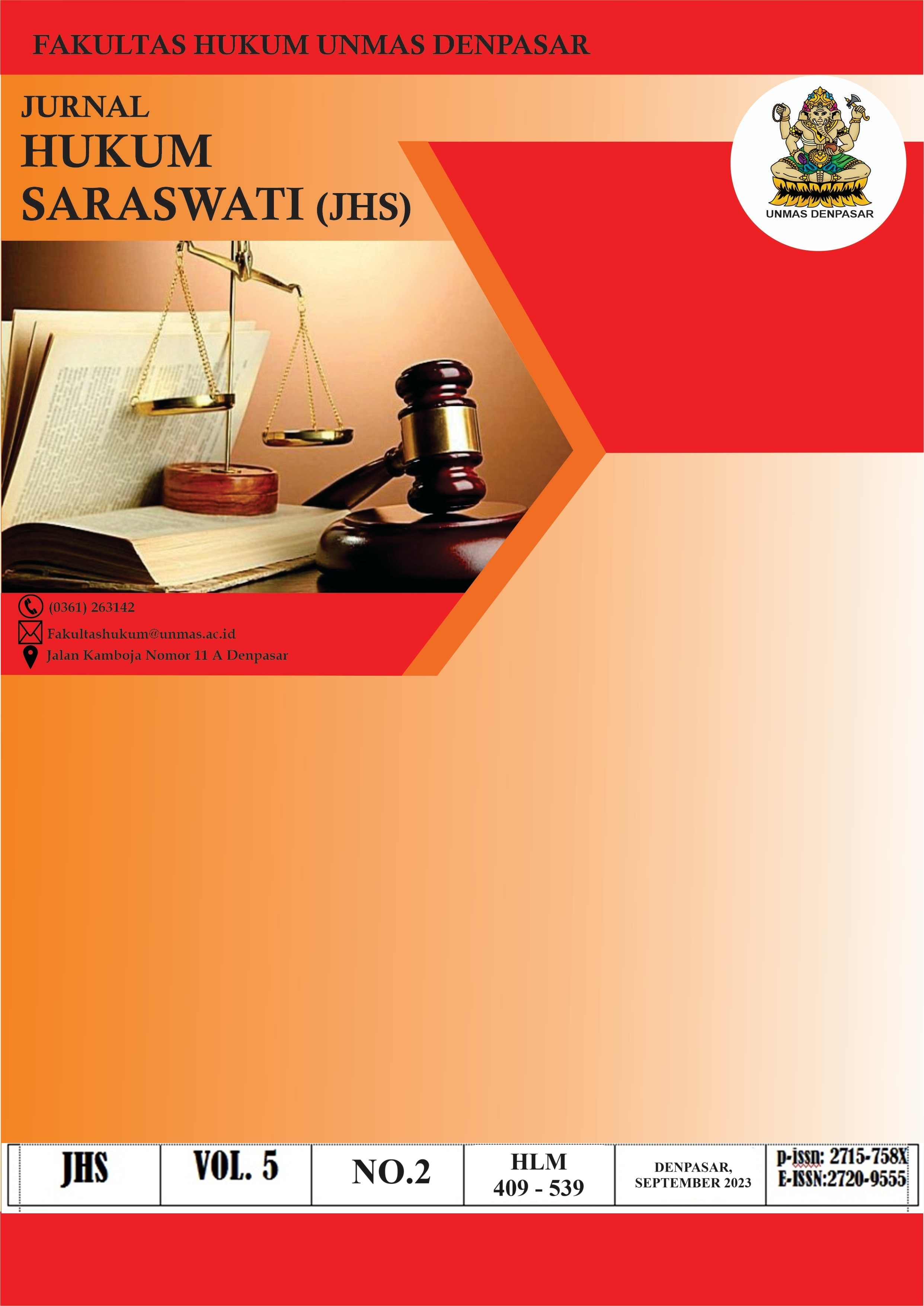PERLINDUNGAN HUKUM TERHADAP DEBITUR ATAS PERMOHONAN PAILIT YANG DIAJUKAN OLEH KREDITUR TIDAK BERITIKAD BAIK
Keywords:
Bankruptcy, Debts and Receivables, Legal Protection, Good FaithAbstract
Protection of debtors is very important, in order to guarantee certainty, justice and legal benefits in society. Law Number 37 of 2004 concerning Bankruptcy and Postponement of Debt Payment Obligations. This regulation was issued in order to provide certainty, justice and legal benefits as well as fulfill business interests in resolving all issues related to the company's debts. Apart from that, this regulates the protection of the rights of the parties in the subject of bankruptcy. However, sometimes existing regulations are not implemented properly so that the effectiveness of existing regulations does not apply optimally. So maximum efforts are needed to achieve a desired legal goal. In this research the author uses normative juridical research methods by examining the extent to which Law Number 37 of 2004 can overcome problems related to debtors in bankruptcy. The insolvency test is a form of legal protection for debtors who still have good solvency and have good intentions.
References
BUKU
Depdikbud-Balai Pustaka, 2001, Kamus Besar Bahasa Indonesia, Balai Pustaka, Edisi Ketiga, Jakarta
Lilik Mulyadi, 2013, Perkara Kepailitan dan Penundaan Kewajiban Pembayaran Utang (PKPU) Teori dan Praktik, PT. Alumni, Bandung
Munir Fuady, 2005, Hukum Pailit Dalam Teori dan Praktek, Edisi Revisi Disesuaikan dengan Undang-Undang Nomor 37 Tahun 2004, Liberty, Yogyakarta
Sudargo Gautama, 2008, Komentar Atas Peraturan Kepailitan Baru Untuk Indonesia, Citra Aditya, Bandung
Zainal Asikin, 2013, Hukum Kepailitan dan Penundaan Kewajiban Pembayaran Utang di Indonesia, Pustaka Reca Cipta, Bandung
JURNAL ILMIAH
Agustina Ni Made Ayu Darma Pratiwi, Putu Sekarwangi Saraswati, 2021, Tinjauan Yuridis Undang-Undang Nomor 34 Tahun 2004 Tentang Kepailitan dan PKPU Mengenai PKPU dalam hal Debitur Pailit Dimasa Covid 19, Media Keadilan : Jurnal Ilmu Hukum, Fakultas Hukum Universitas Muhammadiyah Mataram, Volume 12 Nomor 1.
Arie Exchell Prayogo Dewangker, 2020, Penggunaan Klausula Force Majeure Dalam Kondisi Pandemik, Jurnal Education and Development, Institut Pendidikan Tapanuli Selatan, Volume 8 Nomor 3.
Asifah Elsa Nurahma Lubis, Farhan Dwi Fahmi, 2021, Pengenakan dan Definisi Hukum Secara Umum (Literature Riview Etika), Jurnal Ilmu Manajemen Terapan, Dinasti Review, Volume 2 Nomor 6.
Kambu, W, M, 2021, Tinjauan Yuridis Tentang Hak Asasi Manusia Berdasarkan Pasal 28d ayat 3 Undang-Undang Dasar 1945, Lez Et Societatis,Volume 9 Nomor 1, Fakultas Hukum Universitas Sam Ratulangi.
Kendry Tan, 2022, Preventing Debtor Bankcruptcy during the Covid-19 Pandemic Benefits of Suspension of Debt Payment Obligations & Insolvency Test ?, Journal Of Judicial Review, Universitas Internasional Batam, Volume 24 Nomor 2.
M Hadi Shubhan, 2014, Insolvelcy Test : Melindungi Perusahaan Solven yang Beritikad Baik dari Penyalahgunaan Kepailitan, Jurnal Hukum Bisnis, Universitas Narotama, Volume 33 Nomor 1.
Putu Eka TrisnaDewi, 2018, Penyelamatan Kredit Bermasalah Sebagai Upaya Mengurangi Tingginya Non performance Loan (NPL) Pada Perbankan, Jurnal Advokasi, Volume 8 Nomor 1, Fakultas Hukum Universitas Mahasaraswati Denpasar.
Putu Eka TrisnaDewi, 2019, Implementasi Penundaan Kewajiban Pembayaran Utang (PKPU) Dalam Kepailitan Ditinjau Dari Undang-Undang Nomor 37 Tahun 2004 Tentang Kepailitan Dan Penundaan Kewajiban Pembayaran Utang, Jurnal Hukum Saraswati (JHS), volume 1 Nomor 2, Fakultas Hukum Universitas Mahasaraswati Denpasar.
Putu Eka Trisna Dewi, 2021, The Execution of Bankrupt Assets in the Case of Cross-Border Insolvency: A Comparative Study between Indonesia, Malaysia, Singapore, and the Philippines, The Indonesian Journal of Southeast Asian Studies (IKAT), Volume 5 Nomor 1, Center for Southeast Asian Social Studies (CESASS) Universitas Gadjah Mada, Yogyakarta.
Putu Eka Trisna Dewi, 2023, Legal Consequences of Bankruptcy on Joint Assets after Divorce, Jurnal Hukum Prasada, Volume 10, Nomor 1, Pascasarjana Universitas Warmadewa.
Putu Eka TrisnaDewi, 2023, Karakteristik Khusus Pengadilan Niaga Dalam Mengadili Perkara Kepailitan, Jurnal Hukum Saraswati (JHS), volume 5 Nomor 1, Fakultas Hukum Universitas Mahasaraswati Denpasar.
Putu Eka Trisna Dewi, Ni Luh Putu Geney Sri Kusuma Dewi, Ni Putu Riyani Kartika Sari, 2021, Regulation of Copyright Certificate as a Material Guarantee and Bankrupt Estate/Beodel in Indonesia, ADI Journal on Recent Innovation, Volume 2 Nomor 2, Asosiasi Dosen Indonesia (ADI).
Rahmani, Imanuel, 2018, Perlindungan Hukum Kepada Pembeli Dalam Kepailitan Pengembang (Developer) Rumah Susun, Jurnal Hukum Bisnis Bonum Comunne, Faculty of Law, Universitas 17 Agustus 1949 Surabaya, Volume 1 Nomor 1.
Rai Mantili& Putu Eka Trisna Dewi, 2021, Penundaan Kewajiban Pembayaran Utang (PKPU) Terkait Penyelesaian Utang Piutang Dalam Kepailitan, Jurnal Aktual Justice, Volume 6 Nomor 1, Magister Hukum Pascasarjana Universitas Ngurah Rai.
Sonyendah Retnaningsih, 2018, Perlindungan Hukum Terhadap Debitor Pailit Individu dalam Penyelesaian Perkara Kepailitan di Indonesia, ADHAPER : Jurnal Hukum Acara Perdata, Fakultas Hukum Universitas Airlangga,Volume 3 Nomor 1.
PERATURAN PERUNDANG-UNDANGAN
Undang-Undang Dasar Negara Republik Indonesia Tahun 1945
Undang-Undang Nomor 37 Tahun 2004 Tentang Kepailitan dan Penundaan Kewajiban Pembayaran Utang
Downloads
Published
How to Cite
Issue
Section
License
- Copyright notice
Authors who publish with this journal agree to the following terms:
- Authors retain copyright and grant the journal right of first publication with the work simultaneously licensed under aCreative Commons Attribution License that allows others to share the work with an acknowledgement of the work's authorship and initial publication in this journal.
- Authors are able to enter into separate, additional contractual arrangements for the non-exclusive distribution of the journal's published version of the work (e.g., post it to an institutional repository or publish it in a book), with an acknowledgement of its initial publication in this journal.
- Authors are permitted and encouraged to post their work online (e.g., in institutional repositories or on their website) prior to and during the submission process, as it can lead to productive exchanges, as well as earlier and greater citation of published work (See The Effect of Open Access).







